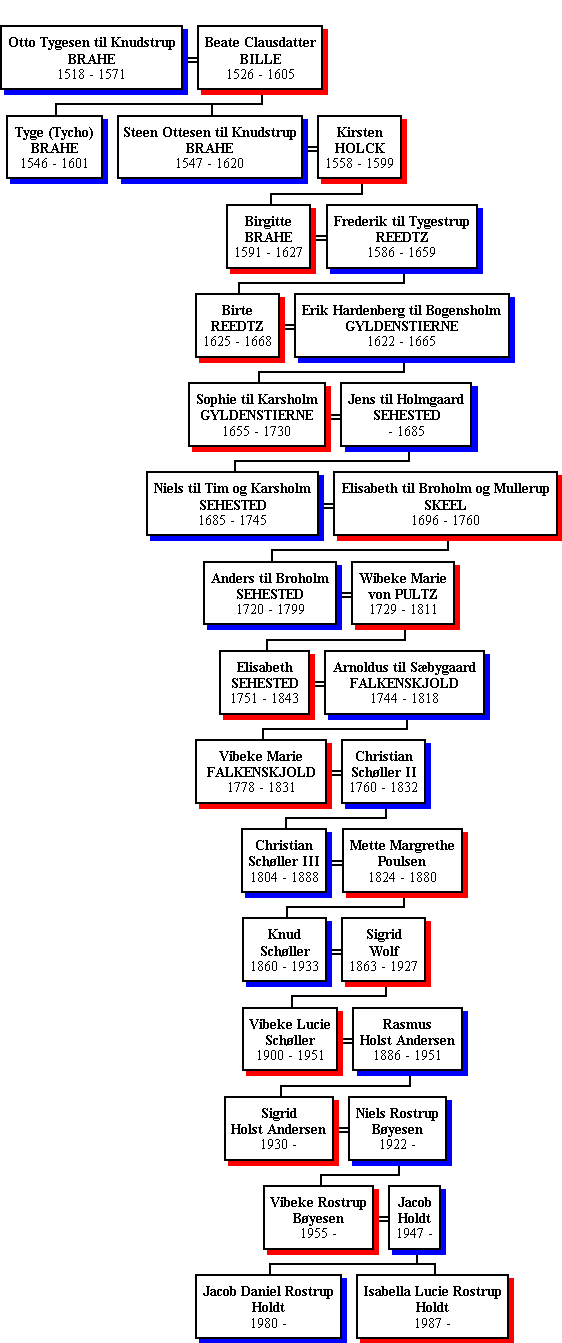

Tyge (Tycho) Brahe:
11th great-granduncle
| Tyge (Latinized
as Tycho) Brahe was born on 14 December 1546 in Skane, then in Denmark,
now in Sweden. He was the eldest son of Otto Brahe and Beatte Bille,
both from families in the high nobility of Denmark. He was brought up
by his paternal uncle Jörgen Brahe and became his heir. He attended
the universities of Copenhagen and Leipzig, and then traveled through
the German region, studying further at the universities of Wittenberg,
Rostock, and Basel. During this period his interest in alchemy and astronomy
was aroused, and he bought several astronomical instruments. In a duel
with another student, in Wittenberg in 1566, Tycho lost part of his
nose. For the rest of his life he wore a
metal insert over the missing part. He returned to Denmark in 1570.
In 1572 Tycho observed the new star in Cassiopeia and published a brief tract about it the following year. In 1574 he gave a course of lectures on astronomy at the University of Copenhagen. He was now convinced that the improvement of astronomy hinged on accurate observations. After another tour of Germany, where he visited astronomers, Tycho accepted an offer from the King Frederick II to fund an observatory. He was given the little island of Hven in the Sont near Copenhagen, and there he built his observatory, Uraniburg, which became the finest observatory in Europe. Tycho designed and built new instruments, calibrated them, and instituted nightly observations. He also ran his own printing press. The observatory was visited by many scholars, and Tycho trained a generation of young astronomers there in the art of observing. After a falling out with King Christian IV, Tycho packed up his instruments and books in 1597 and left Denmark. After traveling several years, he settled in Prague in 1599 as the Imperial Mathematician at the court of Emperor Rudolph II. He died there in 1601. His instruments were stored and eventually lost. Tycho Brahe's contributions to astronomy were enormous. He not only designed and built instruments, he also calibrated them and checked their accuracy periodically. He thus revolutionized astronomical instrumentation. He also changed observational practice profoundly. Whereas earlier astronomers had been content to observe the positions of planets and the Moon at certain important points of their orbits (e.g., opposition*, quadrature *, station), Tycho and his cast of assistants observed these bodies throughout their orbits. As a result, a number of orbital anomalies never before noticed were made explicit by Tycho. Without these complete series of observations of unprecedented accuracy, Kepler could not have discovered that planets move in elliptical orbits. Tycho was also the first astronomer to make corrections for atmospheric refraction*. In general, whereas previous astronomers made observations accurate to perhaps 15 arc minutes, those of Tycho were accurate to perhaps 2 arc minutes, and it has been shown that his best observations were accurate to about half an arc minute. Tycho [Tyge] Brahe (1546-1601), probably the greatest pre-telescopic astronomer. Born on 14 December 1546 in Knudstrup (Denmark) and of noble descent, he was sent by his family to study in Copenhagen, then to Leipzig to study Law, but he soon became entirely occupied with astronomy. In 1565 and 1566 Tycho studied mathematics at the universities in Wittenburg and Rostock. It is in Rostock that Tycho engaged in a duel with a fellow student and nobleman, that ended up costing him part of his nose. Tycho's reputation as an accomplished astronomer rose quickly, primarily through his observations of and writings on the 1572 Novae in Cassiopea, and of the 1577 comet. Tycho demonstrated, perhaps more convincingly than anyone before him, the falsity of the Aristotelian doctrine of the immutability of the Heavens, and of the Aristotelian theory of comets as an atmospheric phenomenon taking place in the sublunar sphere. On May 23 1576, by royal decree the Danish King Frederick II granted Tycho the island of Hven, east of Copenhagen (now part of Sweden, but a Danish possession at the time), as well as an annual stipend to further Tycho's astronomical researches. Tycho took full advantage of his independence and financial security. He established on the island the Uraniborg Observatory. Throughout his career, and in particular at Uraniborg, Tycho proceeded to build astronomical measuring instruments of unprecedented accuracy, not to mention physical size. He also established his own printing press on Hven, and build a second underground observatory with isolated observing stations to ensure reliably independent multiple astronomical measurements.
|

Back to Kinship with famous Nordic figures
Tilbage til min slægtsside Back to my genealogy page
Tilbage til Amerikanske Billeder Back to American Pictures